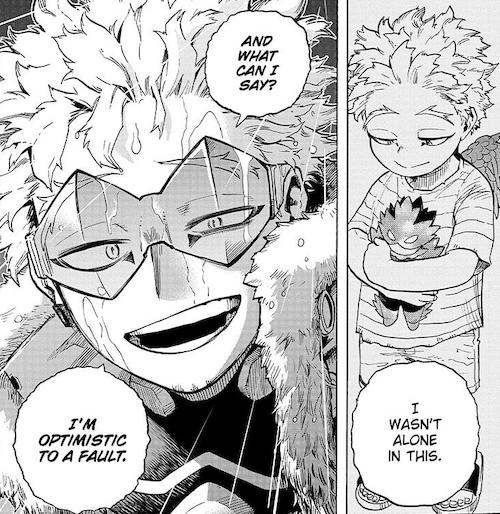 |
|
Now it’s your turn! |
I suppose Nagant’s dead? Endeavor mentions having both Nagant and Chisaki in custody and requests medical aid. It’s still unclear to me whether that was for her or Chisaki, but given the direction of the chapter and the fact that Nagant has served the purpose of relaying valuable information, causing emotional damage to Deku and having a moment with Hawks over their shared history, that might as well be the last we see of the Lovely Lady Nagant, The Plot Device. Yes, I’m bummed she’s gone, I liked her.
Also, aside from his backstory and task of infiltrating the League of Villains, we don’t know much of Hawks’ role with the SC. Did he kill people like Nagant? Not only obvious life threats amidst civil war like was the case of Twice, has he killed people who hadn’t done anything yet? Voices that needed to be shut off before they reached the limelight? “I’m optimistic to a fault”: nah, I don’t buy this. Partially yes, but I enjoy Hawks’ character often for what he leaves unsaid or cloaked in a contradiction. I hope we get to explore more of his personal motivations and objectives in the future.
 |
|
There’s more to this than just optimism… |
“Ours is a regimented society under tight control. One where the wrong sort of individuality gets you ostracized, purged. Democracy? Socialism? Doesn’t matter. There are no exceptions, because the root of all this predates the concept of human society altogether. It’s the principle that governs all social organisms. ” BAM! Just like that. In case you missed my commentary about Japanese society and tightness of culture in my previous BNHA analysis, here’s a link to that. AFO’s speech brought to mind Nietzsche’s account of the development of guilt and bad conscience in human society:
“How can one create a memory for the human animal? How can one impress something upon this partly obtuse, partly flighty mind, attuned only to the passing moment, in such a way that it will stay there?
One can well believe that the answers and methods for solving this primeval problem were not precisely gentle; perhaps indeed there was nothing more fearful and uncanny in the whole prehistory of man than his mnemotechnics. ‘If something is to stay in the memory it must be burned in: only that which never ceases to hurt stays in the memory’–this is a main clause of the oldest (unhappily also the most enduring) psychology on earth. (…).
Consider the old German punishments; for example, stoning (…), breaking on the wheel (…), piercing with stakes, tearing apart or trampling by horses (…), boiling the criminal in oil or wine (…), cutting flesh from the chest, and also the practice of smearing the wrongdoer with honey and leaving him in the blazing sun for the flies. With the aid of such images and procedures one finally remembers five or six “I will not’s,” in regard to which one had given one’s promise so as to participate in the advantages of society–and it was indeed with the aid of this kind of memory that one at last came “to reason”! Ah, reason, seriousness, mastery over the affects, the whole somber thing called reflection, all these prerogatives and showpieces of man: how dearly they have been bought! How much blood and cruelty lie at the bottom of all ‘good things’!”
– Friedrich Nietzsche, On The Genealogy of Morals / Ecce Hommo – Second Essay / Section 3
People have a predisposition to being uncooperative and potentially dangerous. What is common between One for All and Nietzsche’s perspectives here is that, historically, the potentially dangerous or undesirable aspects of individuality have been purged through ostracism, humiliation, fear, and punishment. Both Nietzsche and AFO highlight the tension between society and the individual. It is through pain that man is tamed, that he remembers what he ought not do. He is coerced into conformity against his will, against nature, at the expense of individual freedom.
The path Izuku has chosen is indeed a thorny one. The average person doesn’t want to take responsibility on a personal level, nevermind socially and civically. It’s much easier to just blindly follow and believe that everything is being done with our best interest in mind. To question the personal motives of others, which can be nefarious, is a great source of anxiety and unrest. “This is the way things have been done and they seem to have worked so far; might as well continue on.” The absence of fundamental building blocks of development–critical thinking, real teaching of skills (through long-term mentorship relationships, for example), emotional awareness, and unbiased socio-political-historical information–stands in the path of generational healing and systemic cultural change. Deku is beginning to realize this. But he’s not willing to go as far as AFO, who begins with the premise that the conflict of interest between society and the individual is essentially irreconcilable, and aspires to tear it all down so he might lord over an anarchistic meritocracy. Though this is only a guess at AFO’s true intentions.

I found you on Tumblr bc of your bnha incorrect quotes but I’m staying bc of your reviews! I don’t think I’ve ever read a review like this before.
I’ve always had a hard time understanding philosophy and even reading it, it’s just kind of hard for me, I guess? But I really enjoyed how you explained the concepts with your own words, I got to re-read the quote and understand it better! I’m off now to read the chapter again and your other reviews.
Oh! Ha ha omg! I’m glad you’ve come over here!
I used to be really scared of philosophy, but then I was introduced to Nietzsche by my mentor and we’ve been studying him (and other concepts for about a year now). Whenever I’m on my own, I enjoy Stanford’s Encyclopedia of Philosophy a lot. They break down excerpts like I did (but obviously much higher level than myself ha ha).
Thank you so much for taking your time to share what you liked about this piece! I’m still discovering my voice as a writer and sometimes I feel like I go a bit too deep and I’m concerned it can be overwhelming, so I’m trying to find a nice balance (but I’m also a moody writer, unfortunately). That’s why any feedback is greatly appreciated.